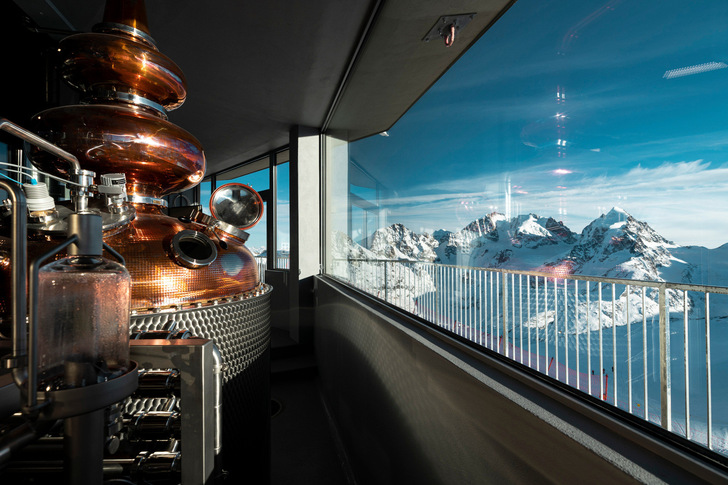Since 2010, friends Rinaldo Willy from the Engadine and Pascal Mittner from Chur have set themselves the goal of making Switzerland known as a whisky nation, and with their multi-award-winning whisky "Orma" they are focusing on a regional production method.
"We wanted to make a whisky that brings home and terroir into the bottle," Willy and Mittner explain. Each of their single cask editions therefore shows different colourings and nuances, depending on the climate or wine cask in which they were matured. The name of the whisky production also refers to the company's philosophy: Orma means "soul" in Rhaeto-Romanic and stands for their Graubünden roots.
The water comes from the springs near the Murtèl middle station of the Corvatsch cable car. The whisky is stored in various places in the region: in the deep vaulted cellars of Engadine castles or monasteries, in earth cellars and wooden warehouses in the Grisons - or in the grotto of the Corvatsch mountain station.
A unique whisky production in the mountains
When the opportunity arose about two years ago to use an empty storage room at the Corvatsch mountain station, the two visionaries jumped at the chance and planned the highest distillery in the world. It sounds like a marketing ploy, but it's not: at an altitude of 3303 metres, the boiling point for distillation is 10 degrees Celsius lower than at sea level.
This saves costs, especially since the plant is also tempered directly by the cool mountain air.
See also: Window installation at dizzying heights
Of greater importance for whisky production, however, is the fact that the lower distillation point preserves more aromas and greater complexity in the distilling process - a unique selling point for Swiss whisky enthusiasts.
How to visit the distillery
The location of the new Orma distillery is sensational. Surrounded by the Bernina massif and the Corvatsch glacier with a view of the unique lake landscape of the Upper Engadine, a visit to the single malt whisky distillery is a very special experience for all the senses. Three days a week there are selected guided tours with tasting for small groups.
In order to be able to enjoy the view of the breathtaking landscape to the fullest, and also to provide an equally fascinating insight into the distillery, the owners opted for large windows with highly energy-efficient insulating glazing when converting the storage rooms.
Insulating glass for extreme conditions
The windows were fitted with triple-glazed insulating glass with MGTherm Öko Star thermal insulation glass from MGT Mayer Glastechnik. The insulating glass has very good thermal insulation properties and meets high energy and aesthetic demands, even in the extreme weather conditions at the mountain station. The Öko-Star insulating glass units are all equipped with the Swisspacer Ultimate spacer.
"We now use the Ultimate as standard," says Harald Lerchster, authorised signatory and sales manager at MGT Mayer Glastechnik. "The spacer simply convinces us with its excellent performance and an aesthetic matt surface."
Also interesting: Extraordinarily thin glazing with profile systems from Forster
The high stability of the hollow profile of Swisspacer Ultimate ensures exceptional parallelism of the frames. The film also ensures a long functional and service life.
Glass installation at a height of over 3000 metres
At 4900 x 2100 mm, the largest façade element measures over 10 square metres. These formats were a great challenge - not only for the cramped site conditions at an altitude of over 3000 metres, but also because the elements had to be delivered by helicopter.
In order to avoid the climatic loads during transport from the valley to the mountain, MGT Mayer Glastechnik set a pressure equalisation valve at the factory. This valve was closed and sealed again at the construction site.
With ultrasonically welded frame corners, MGT Mayer additionally ensured an attractive appearance of the corner design and optimised load transfer for the insulating glass units of the Orma distillery.
"We process over 50 tonnes of glass every day for almost all areas of application in construction - but this very special project will remain in our memories for a long time," says Harald Lerchster.














